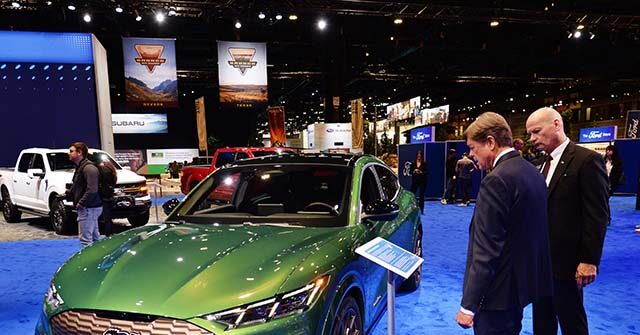
Ford Motor Company reported a whopping $132,000 loss on each electric vehicle sold during the first three months of the year, amassing a $1.3 billion loss.
The post Ford Loses $1.3 Billion on Electric Vehicles in First Quarter of 2024, Delays Plans to Make More appeared first on Breitbart.

Ford Motor Company reported a whopping $132,000 loss on each electric vehicle (EV) sold during the first three months of 2024, amassing a $1.3 billion loss.
The auto manufacturer’s electric vehicle unit revealed Thursday that they experienced a 20 percent decrease in sales volume and were forced to slash prices due to low consumer demand, CNN reported.
RELATED VIDEO — Granholm: Slumping EV Demand Partially Due to Higher Prices, “Confusing” Tax Incentives:
The revenue for Ford’s EV car, the Model e, plunged by 84 percent to about $100 million, which the company blamed on EV price cuts across the auto industry.
“That resulted in the $1.3 billion loss before interest and taxes (EBIT), and the massive per-vehicle loss in the Model e unit,” the publication noted.
The recent figures are part of a trend of loss for Ford, with their Model e reporting a full-year EBIT loss of $4.7 billion on the sale of 116,000 units. This is an average loss of $40,525 per vehicle — and even that is just a third of the per-vehicle loss seen in the first three months of 2024.
Now, company officials are estimating that their EV division will lose a grand total of $5 billion this year, up from $4.7 billion last year.
“Americans don’t want EVs at levels Biden’s climate hysteria require,” author and businessman Andy Puzder wrote on X. “Ford’s EV Q1 losses soared to $1.3 billion — a ridiculous $132,000 per EV sold. All Ford’s profits came from combustion engine vehicle sales. Collectivist policies destroy prosperity.”
Americans don’t want EVs at levels Biden’s climate hysteria require. Ford’s EV Q1 losses soared to $1.3 billion – a ridiculous $132,000 per EV sold. All Ford’s profits came from combustion engine vehicle sales. Collectivist policies destroy prosperity. https://t.co/U24fA4YHTz
— Andy Puzder (@AndyPuzder) April 25, 2024
“This does not appear to be “sustainable,” said environmentalist Patrick Moore.
Ford reports for the first quarter they lost $132,000 on every EV sold. This does not appear to be “sustainable”.https://t.co/1dKe4T2jcd
— Patrick Moore (@EcoSenseNow) April 28, 2024
Energy and environmental science expert Steve Milloy called Ford’s loss a “massive EV disaster.”
Massive EV disaster:
Ford lost $132,000 on every EV sold in the first quarter of this year.https://t.co/NK658JiY09 pic.twitter.com/BAZ80l6zZm
— Steve Milloy (@JunkScience) April 27, 2024
Ford announced earlier this month that the company will delay producing two new electric models, opting for hybrid vehicles instead.
“Many companies rushed in too fast with E.V.s that were too expensive and there was not as much of a market for them as they thought,” Sam Abuelsamid, transportation and mobility analyst at research firm Guidehouse Insights, told the New York Times. “That’s made it a lot tougher to sell those vehicles.”




